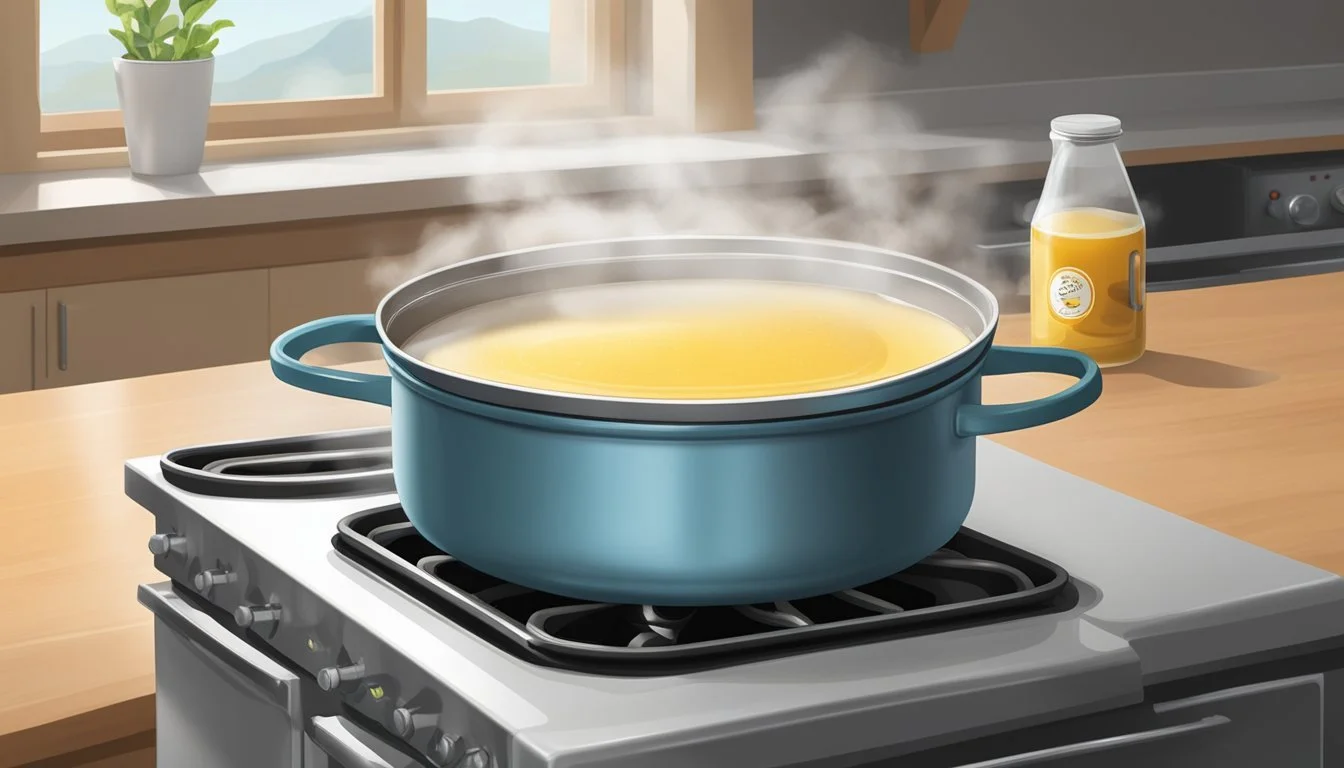Is It Safe to Use Expired Chicken Broth?
Understanding Food Safety Concerns
Determining the safety of using expired chicken broth is a common concern in many kitchens. Chicken broth is an essential ingredient in numerous recipes, adding flavor and depth to dishes. Its shelf life and the implications of the expiration date printed on the packaging are topics of interest for both home cooks and culinary professionals.
The expiration date on a chicken broth container serves as a manufacturer's estimation of when the product will be at its best quality. Chicken broth, like many other food items, does have the potential to spoil. Once opened, the broth's exposure to bacteria and air can lead to degradation, which means careful handling and storage are crucial to prolong its usability.
Consumers can often use chicken broth beyond its labeled expiration date if stored properly. However, it is necessary to assess its quality by checking its appearance, smell, and taste. If any signs of spoilage are present—such as an off odor, mold, or cloudiness—the broth should not be consumed. Safe food handling practices help minimize the risk of foodborne illnesses and ensure that chicken broth remains a reliable and tasty component in a variety of meals.
Understanding Chicken Broth
Chicken broth is a versatile and commonly used ingredient in kitchens worldwide, serving as a base for soups, sauces, and many other dishes. It can be categorized by its type, compared with chicken stock, and distinguished by its homemade or store-bought forms.
Types of Chicken Broth
Canned Chicken Broth: It typically has a long shelf life and is conveniently ready to use. Boxed Chicken Broth: Similar to canned, it is often found in aseptic cartons and can be a staple in pantries for quick cooking needs.
Chicken Broth vs Stock
Chicken broth is made by simmering chicken meat and bones, sometimes with vegetables and aromatics, resulting in a light, flavorful liquid. Chicken Stock, on the other hand, is generally made from simmered bones and connective tissues, imparting a fuller, richer flavor and gelatinous texture upon cooling.
Store-Bought vs Homemade Chicken Broth
Homemade Chicken Broth: It's prepared by cooking chicken, vegetables, and herbs, offering a fresher taste but shorter shelf life compared to store-bought versions. Store-Bought Chicken Broth: Convenient and time-saving, it comes in canned or boxed options and often includes preservatives to extend its shelf life.
Safety and Quality
When considering the safety and quality of expired chicken broth, it is essential to differentiate between a decreased quality in taste and texture, and the actual safety risks of consuming a spoiled product.
Identifying Spoiled Chicken Broth
An individual can often identify spoiled chicken broth before tasting it. Spoilage can be evident through changes in appearance, smell, and texture. Unopened chicken broth typically has a longer shelf life due to commercial sterilization processes, but once opened, it becomes susceptible to bacterial contamination.
Signs of Spoilage
Chicken broth that has gone bad may display some or all of the following signs:
Visual changes: Cloudiness or the presence of mold indicates spoilage.
Odor: A sour or otherwise off smell is a clear indicator that the broth should not be consumed.
Texture: If the broth has become thick or has strange particles floating in it, it should be discarded.
Health Risks of Spoiled Broth
Consuming spoiled chicken broth can pose significant health risks, such as food poisoning. Harmful bacteria, including but not limited to, Salmonella and Escherichia coli, may proliferate in improperly stored broth, leading to:
Gastrointestinal distress: Symptoms can include nausea, vomiting, abdominal cramps, and diarrhea.
Severe cases: Certain bacteria, like Clostridium botulinum, which causes botulism, can lead to life-threatening illness if the spoiled broth is consumed.
Always prioritize safety and thoroughly inspect chicken broth for signs of spoilage before use.
Shelf Life and Storage
When it comes to chicken broth, its shelf life and safety largely depend on storage conditions. Ensuring proper storage practices will extend the chicken broth's usability and maintain its quality up to and occasionally beyond the expiration date listed.
Proper Storage Methods
Pantry: Unopened chicken broth should be kept in a cool, dry pantry away from direct sunlight. Once opened, one must transfer it to a sealed container to prevent contamination and spoilage.
Refrigeration: An opened container of chicken broth should be refrigerated promptly and ideally used within 1-2 days. Proper refrigeration at a temperature of 40°F (4°C) or lower is crucial to prevent bacterial growth.
Freezer: To further extend its shelf life, chicken broth can be frozen. Store the broth in a freezer-safe container or bag, leaving some space to account for expansion. Properly frozen broth can last for 2-6 months while maintaining its quality.
Factors Affecting Shelf Life
Several factors influence the shelf life of chicken broth. These include:
Temperature: Fluctuating or consistently high temperatures can impact the broth's quality.
Sealed Container: Once opened, exposure to air can introduce bacteria and other contaminants.
Light: Direct exposure to light can degrade the quality of food and beverages, including chicken broth.
Expiration Dates and Food Safety
Expiration Date: While the expiration date is important, it often indicates peak quality rather than safety. Chicken broth stored properly may still be safe after the expiration date, but one should always assess its quality.
Food Safety: Should the chicken broth exhibit signs of spoilage such as off odors, cloudiness, or mold, it should be discarded immediately. Trusting one's senses plays an essential role in food safety evaluation.
Using Expired Chicken Broth
When considering the use of expired chicken broth, it is crucial to assess its safety, understand the associated risks, and explore viable alternatives to avoid waste.
Assessing Expired Chicken Broth
Expired chicken broth requires a thorough evaluation before use. One should examine the broth for any changes in smell, color, and texture. A sour smell, a cloudy appearance, or a slimy texture indicates spoilage. If the broth has been stored in an unopened, commercially sealed container, it may last beyond the printed date, provided there are no signs of spoilage. Trust in one's senses serves as a critical tool in this assessment.
Risks of Consuming Expired Chicken Broth
The primary concern with consuming expired chicken broth lies in the potential health risks, especially when it comes to foodborne illnesses. Bacterial growth, like that of Clostridium botulinum or Salmonella, can occur in improper storage conditions or when the broth has been stored for too long, even if there are no visible spoilage signs. Individuals with compromised immune systems should avoid consuming expired broth to prevent any severe health consequences.
Alternatives to Discarding Expired Broth
If the expired chicken broth is deemed unsafe, it doesn't mean one has to waste it. Some alternatives include:
Repurposing: Use it as a nutrient-rich addition to compost if you are into gardening.
Substitution: Replace it in recipes with alternatives such as vegetable broth, beef broth, or bouillon cubes mixed with water.
If the broth is only slightly past its date and shows no spoilage signs, freezing can prolong its life for use in future cooking endeavors.
Preservation Techniques
Proper preservation is vital for maintaining the safety and quality of chicken broth beyond its expiration date. Through freezing and flavor conservation methods, one can extend the lifespan of chicken broth while retaining its taste and aroma.
Freezing Chicken Broth
Freezing chicken broth is an effective way to prolong its shelf life. For optimal results:
Step 1: Cool the broth to room temperature before freezing.
Step 2: Pour the broth into an airtight container, leaving some space to account for expansion as it freezes.
Step 3: Seal the container tightly and label it with the freezing date.
Step 4: Store in the freezer, where the frozen chicken broth can be safely kept for an extended period.
It is important to note that when one wishes to use the frozen broth, it should be thawed safely in the refrigerator and not at room temperature to prevent bacterial growth.
Conserving Broth Flavor and Aroma
To maintain the flavor and aroma of chicken broth:
Do not repeatedly freeze and thaw the broth, as this can lead to a loss of flavor integrity.
Keep the broth in small portion-sized containers when freezing to only defrost what is needed.
Use the broth within 2-3 days after thawing for the best preservation of flavor and aroma.
In the event of any noticeable odor changes or flavor loss after thawing, it is advised to discard the broth as these are signs of spoilage.
FAQs
This section addresses common questions regarding the handling and shelf life of chicken broth to ensure safety and optimal taste.
Can You Freeze Chicken Broth?
Chicken broth can be efficiently preserved by freezing it. Homemade or opened chicken broth should be poured into a freezer-safe container, leaving some space to accommodate expansion as it freezes. Commercial broth can also be frozen directly in its original unopened carton.
How Long Does Chicken Broth Last?
Unopened chicken broth stored in a pantry typically remains at peak quality for 1 to 2 years past its printed date. Once opened, it should be refrigerated and used within 4 to 5 days. Freezing extends its shelf life up to 6 months for best quality.
How to Tell If Chicken Broth Is Bad?
To determine if chicken broth is bad, look for changes in color, cloudiness, or a sour smell. Any signs of mold or off-flavors also indicate spoilage. It’s important to discard any broth that exhibits these signs of deterioration.
Conclusion
When considering the safety of using expired chicken broth, one should rely on both sensible storage practices and their own senses. An expiration date is not a hard stop for when a product turns unsafe, rather it's the manufacturer's best estimation for peak quality.
Storage is paramount:
Ensure the chicken broth has been sealed and refrigerated properly if opened.
For unopened containers, check that they have been stored in a cool, dry place.
One should examine the broth before use:
Look for any changes in color or mold.
Sniff for off odors, indicating spoilage.
Taste a small amount for any sourness or unusual flavors.
If any of the checks raise concerns, it's advised to err on the side of caution and dispose of the broth. While many individuals may consume chicken broth slightly past its expiration date without issue, those with compromised immune systems should avoid any potential risks.
Remember, good judgment and food safety practices are essential in determining whether expired chicken broth can still be part of one’s recipe.
Note: When it comes to homemade broth, its freshness lasts notably less than commercially prepared ones. Therefore, freezing homemade broth is a common practice to extend its shelf life.




